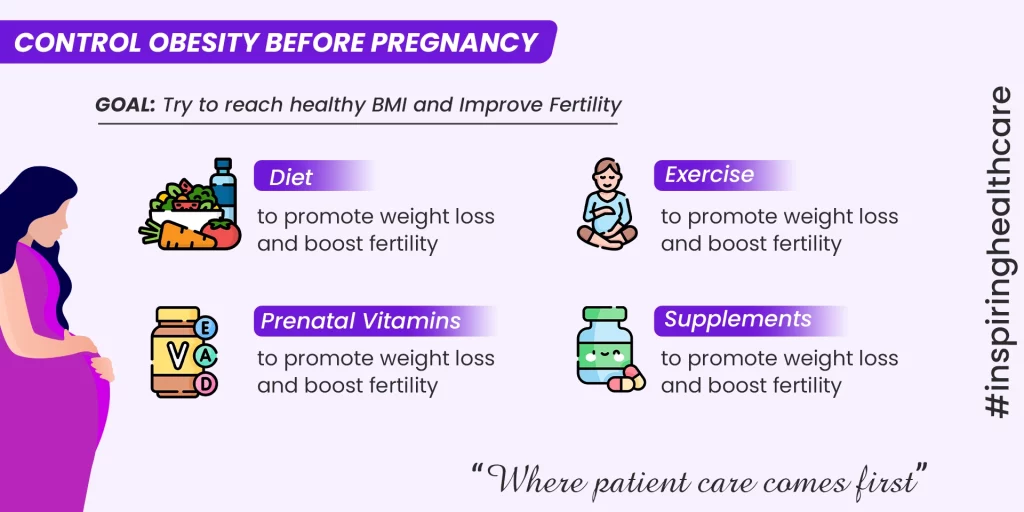Medically Reviewed by: Dr. Sonali Sharma MD- GYNAE & OBS
Pregnancy is a special time in a woman’s life, but it can come with challenges, especially if you’re dealing with obesity. In this blog, we’ll explore what obesity in pregnancy means, why it’s important to address, and how you can overcome obstacles to have a healthy pregnancy journey. Whether you’re an expectant mother struggling with weight concerns or someone supporting a loved one through this journey, this guide is here to provide you with valuable insights, practical tips, and the support you need. Let’s embark on this journey together, empowering you to make the best choices for you and your baby. Obesity during pregnancy can be managed by losing weight safely with the advice of your gynecologist.
Book an online appointment with Dr. Sonali Sharma for Pregnancy & Gynecology related issues.
How Can You Tell You Are Obese?
During pregnancy, obesity is classified as having a Body Mass Index (BMI) of 30 or higher. It’s segmented into three categories, each with escalating health concerns: Obesity category I (BMI 30-34.9), Obesity category II (BMI 35-39.9), and Obesity category III (BMI 40 or higher).
Factors Contributing to Obesity in Pregnancy
Genetic Factors: Genetic predispositions can influence obesity susceptibility. Studies indicate that genetic variations affect metabolism and fat storage.
Lifestyle Choices: Diet and physical activity significantly contribute to pregnancy-related obesity. Unhealthy eating habits, sedentary lifestyles, and lack of exercise can cause excess weight gain, especially with metabolic changes during pregnancy.
Socioeconomic Factors: Economic circumstances affect obesity risk during pregnancy. Limited access to healthy foods, lower education levels, and financial constraints may lead to unhealthy eating habits and higher obesity rates among pregnant women.
Psychological Factors: Stress, emotional eating, and mental health conditions impact pregnancy weight gain. Emotional stress and poor mental health may trigger overeating or unhealthy coping mechanisms, contributing to obesity in pregnant women.
Addressing these factors is crucial. By acknowledging genetic predispositions, promoting healthy lifestyle choices, tackling socioeconomic disparities, and providing psychological support, we can reduce obesity risk during pregnancy and improve maternal and child health outcomes.
Also Read: Boosting Prenatal & Postpartum Fitness: Simple Tips for Moms
Risks of Obesity in Pregnancy
The risks of obesity during pregnancy extend to various complications for both the mother and the baby, as outlined in credible sources:
Maternal Risks:
- Higher risk of gestational diabetes.
- Increased likelihood of PIH (Pregnancy-induced hypertension) and preeclampsia.
- Elevated chance of labor and delivery complications, including the need for instruments or emergency cesarean section.
- Greater susceptibility to blood clots and heavier postpartum bleeding.
- Potential challenges in receiving pain relief during labor, including issues with epidural administration.
Fetal Risks:
- Elevated risk of premature birth or stillbirth.
- Increased chances of the baby having macrosomia (larger than average size), leading to birth injuries and difficult birth.
- Exposure to an intrauterine environment may predispose the child to obesity and metabolic disorders later in life.
These risks underscore the vital importance of addressing obesity before and during pregnancy to reduce potential complications and ensure the well-being of both the mother and the child.
Also Read: Timing of Pregnancy: How many days after the period does pregnancy occur?
Ways to Overcome Obesity in Pregnancy

To address obesity during pregnancy, various strategies and interventions can be employed, drawing from the insights gleaned from credible sources:
Physical Activity: Regular physical activity plays a vital role. Activities such as walking, swimming, and light resistance training can be beneficial. Aim for 60 minutes of moderate activity on most days of the week.
Healthy Eating: Adopting a balanced, nutritious diet is key. Collaborating with a nutritionist to devise a healthy eating plan.
Weight Management: Shedding excess weight before pregnancy is ideal to mitigate risks associated with obesity. Even modest weight loss can significantly enhance overall health, laying the groundwork for a healthier pregnancy. Strategies like calorie control, exercise, and balanced eating are recommended.
Behavioral Interventions: Behavioral lifestyle interventions encompassing diet and exercise are universally endorsed for managing obesity during pregnancy. These interventions strive to optimize weight during pregnancy, enhancing outcomes for both mother and baby.
Experience exceptional care at Sanjivini Super Speciality Hospital, Lucknow – the premier destination for gynecological health. If you require expert guidance, book your consultation with Dr. S. Sharma, a renowned Gynecologist and Obstetrician. Take the first step towards a healthier you today!
FAQS
- How can I safely manage my weight during pregnancy if I’m obese?
Engage in regular physical activity like walking and swimming, aiming for 60 minutes of moderate activity most days.
- What are some recommended exercises for pregnant women with obesity?
Recommended exercises include walking, swimming, and light resistance training, ensuring safety and comfort during pregnancy.
- Is it possible to lose weight before pregnancy to reduce the risks associated with obesity?
Yes, even modest weight loss before pregnancy can significantly reduce the risks associated with obesity during pregnancy.

